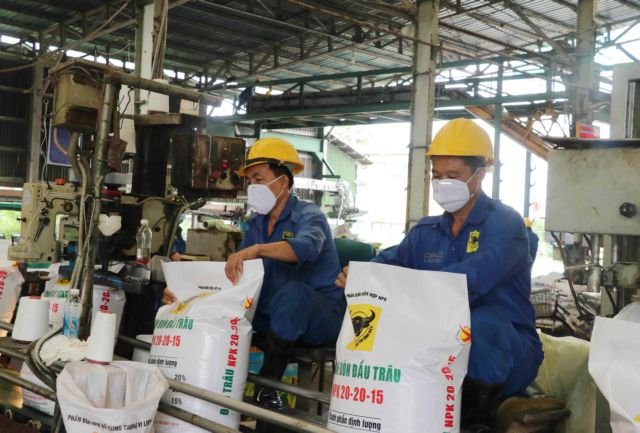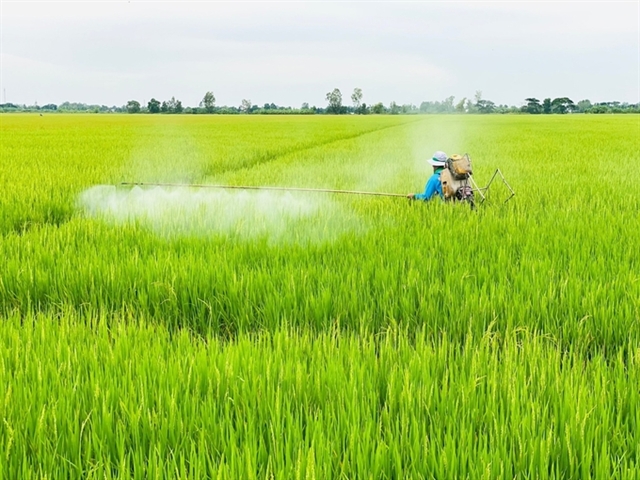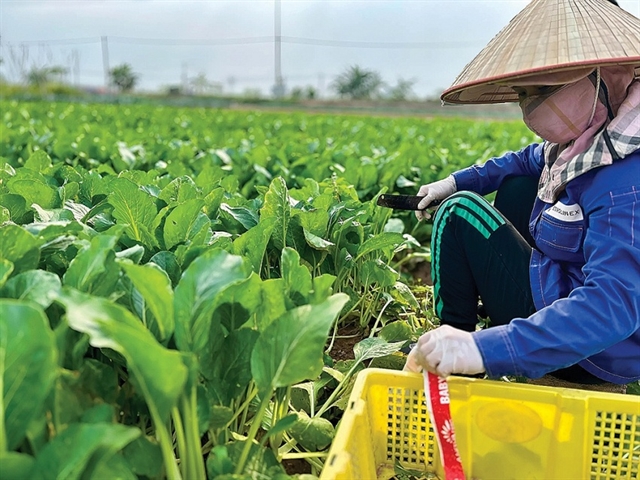 Economy
Economy

 |
| A farmer applying fertiliser on the rice field. — Photo vietnamagriculture.nongnghiep.vn |
Compiled by Mai Hương
The National Assembly (NA) has introduced a draft amendment to the Value-Added Tax (VAT) Law that has drawn significant attention due to a proposal to impose VAT on fertiliser products.
This regulation is expected to impact the fertiliser market, fertiliser manufacturing and trading businesses, and especially farmers.
Việt Nam's agricultural sector has long been considered a vital pillar of the nation's economy. Despite global economic fluctuations and the impact of the COVID-19 pandemic, Việt Nam's agricultural exports have demonstrated impressive resilience, contributing significantly to economic growth.
In 2021, while most sectors suffered, agricultural exports reached US$42.5 billion, growing by 2.74 per cent and contributing 23.54 per cent to the national GDP. The sector's upward trajectory continued in 2022 and 2023, with exports exceeding $53 billion. In the first ten months of this year, agricultural exports hit over $51.7 billion, marking a 20.2 per cent increase compared to the same period last year.
However, a contentious debate has emerged around applying VAT to fertilisers, an essential input in agricultural production. The question at the heart of the discussion is whether Việt Nam should impose a 5 per cent VAT on fertilisers to enhance local production capabilities or maintain the current tax exemption to support farmers.
Since the NA passed Tax Law 71 in 2014, fertilisers have been exempt from VAT in Việt Nam. The intention behind this exemption was to reduce production costs and support farmers by making fertilisers more affordable. However, this policy has led to several unintended consequences that have sparked calls for reconsideration.
Without the ability to claim input tax refund, domestic fertiliser manufacturers face higher production costs. This situation has led to increased prices for locally produced fertilisers, making them less competitive against cheaper imported alternatives.
Data from the Việt Nam Fertiliser Association has revealed that since the exemption of VAT on fertilisers, import volumes have fluctuated between 3.3 and 5.6 million tonnes, with a total value ranging from $952 million to $1.6 billion. Meanwhile, domestic production capacity has drastically shrunk, falling from 3.5 million tonnes per year before 2014 to a mere 380,000 tonnes per year since 2015. This dependency on imported fertilisers threatens Việt Nam's agricultural self-sufficiency and poses risks to food security, especially if global supply chains are disrupted.
 |
| Growing vegetables in a cooperative in Hà Nội. — Photo courtesy of Petrovietnam |
Arguments in favour of imposing VAT on fertilisers
Proponents of applying a 5 per cent VAT argue that such a move could benefit both the agricultural sector and the broader economy.
Phạm Văn Hòa, a member of the NA's Legal Committee, said that a report from the NA Standing Committee indicates that the 2014 VAT exemption for fertiliser has significantly disadvantaged domestic fertiliser manufacturers.
Since these companies cannot deduct VAT on input materials, it gets added to their costs, including taxes. This raises production costs for local fertilisers, making them less competitive with imported ones, which is unfair to domestic producers.
“I agree with the Standing Committee’s proposal to reinstate a 5 per cent VAT on fertiliser. Currently, fertiliser is a price-stabilised product, and the State will regulate prices to ensure they do not rise too sharply,” Hòa said in a recent seminar on this issue.
According to tax expert Nguyễn Văn Phụng, introducing VAT on fertilisers could lead to more competitive pricing, benefitting not just farmers but also enhancing Việt Nam’s agricultural exports.
Furthermore, by levying VAT on fertilisers, the Government could encourage manufacturers to invest in eco-friendly production technologies, aligning with the national goal of sustainable agricultural development. There is also the potential for a positive impact on the State budget, Phụng said.
Việt Nam applying a 5 per cent VAT on fertilisers aligns with international trends and is lower than the VAT rates in many countries. International experience shows that countries like China, Brazil and Russia impose VAT on fertilisers, usually at lower rates than other goods. This approach helps reduce fertiliser costs, supports the growth of the domestic fertiliser industry, encourages investment in advanced, eco-friendly fertiliser technologies and promotes sustainable agricultural development.
Hoàng Trọng Thủy, an agricultural expert, supports this perspective, arguing that VAT could drive innovation in the fertiliser industry. He highlights that applying VAT would incentivise domestic producers to improve product quality, thereby reducing the reliance on imports and boosting Việt Nam’s agricultural competitiveness.
Thủy also suggests that the additional tax revenue could be channelled into training programmes for farmers, helping them adopt sustainable farming techniques and access higher-quality, environmentally friendly fertilisers.
On the other side of the debate, some argue that imposing VAT on fertilisers could increase the financial burden on farmers. Opponents of the fertiliser tax argue that it would increase costs for farmers, who are already facing low profit margins. They believe these higher costs would be passed down to farmers, reducing agricultural output, potentially threatening food security and raising food prices.
Critics also highlight that the current VAT exemption helps keep farming costs low and supports Việt Nam’s rural economy. They warn that the added complexity of VAT implementation could burden small-scale farmers and cooperatives, making compliance challenging.
To cope with this issue, Phụng suggests a phased approach in which VAT is gradually introduced, allowing time for farmers and manufacturers to adjust.
“Although farmers may have to 'endure some pain' in the short term, ensuring a balance of interests and creating a stronger foundation for the agricultural sector means that, in the long run, farmers will not suffer,” Phụng said.
He also advocates for clear communication and educational campaigns to explain how VAT could ultimately benefit farmers through reduced production costs and better-quality fertilisers.
The debate around VAT on fertilisers is not just about economics, but also encompasses environmental concerns. Most fertilisers currently used in Việt Nam are chemical-based, which can have detrimental effects on soil health and ecosystems. By applying VAT, the Government could indirectly promote the use of organic fertilisers and sustainable agricultural practices. This shift would align with Việt Nam’s commitment to sustainable development and reducing greenhouse gas emissions.
Agriculture expert Thủy emphasises that a VAT-inclusive policy could be part of a broader strategy to modernise Việt Nam’s agricultural sector. By incentivising the production and use of eco-friendly fertilisers, the country could achieve its long-term goals of agricultural sustainability, environmental protection and enhanced food security. — VNS




